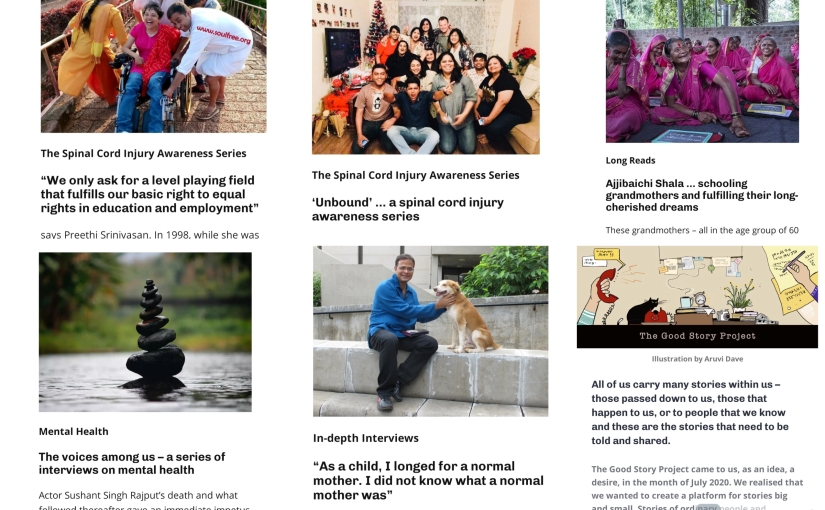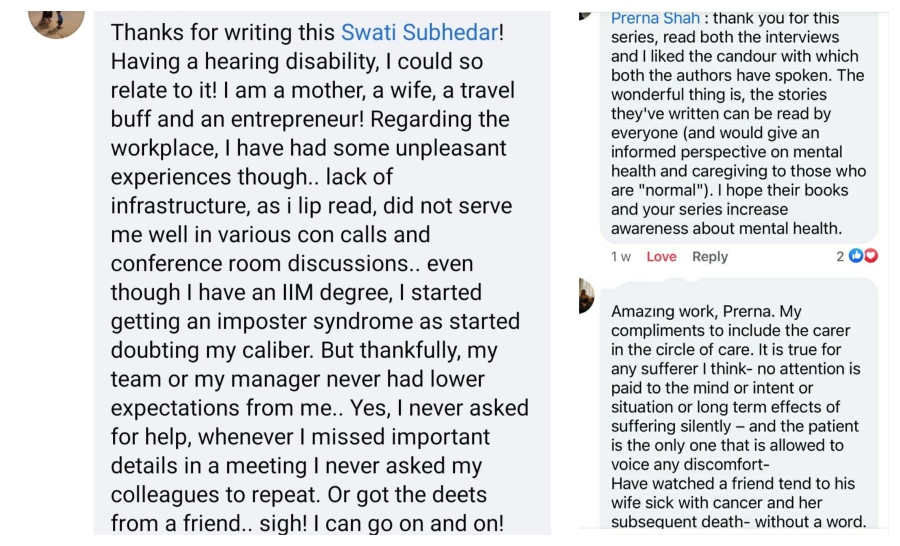“I always thought no one can ever understand me because my situation and my life experiences have been extraordinarily different. Not all in a good, extraordinarily different way though. But after reading Jerry Pinto’s interview here, I think he will definitely understand me. His words moved me to a place of quiet acceptance of all that I felt and experienced in life. Thank you for sharing this. I feel a wonderful sense of kinship with the author. Kindred souls of the same world. His words are so gentle and kind.”
Our first story was published in October 2020. We were concentrating on two series – one that presented voices and experiences of those living with spinal cord injuries, and another on those living with or caring for a person who had a diagnosis of a mental illness. (The mental health series also included interviews with a psychiatrist and a therapist as well as with journalist and author Karishma Upadhyay who has written a biopic on Bollywood actor Parveen Babi.)
While we were certain that we wanted to do these stories, what we did not realize was the impact that these stories would have on us, and the responses we would receive from readers.
In that sense, what did we learn from doing the stories that we did?
Honesty and candour are powerful
One of our most important lessons was that when people talk about their deeply personal and vulnerable issues with honesty and candour, it has a powerful impact on the readers. We were humbled when people trusted us, and were willing to share some of their very difficult moments and insights. Once we published these interviews and first-person accounts and subsequently shared them on social media, we got reactions like the quote this story starts with. The quote came from a woman who responded to the interview with author and novelist Jerry Pinto, in which he talked about among other things, growing up with a mother who was diagnosed with schizophrenia. This was just one of the many reactions that we received on some of our stories, especially those that focused on mental health and spinal cord injuries. The genuinely candid and straightforward first-person accounts and interviews helped other people in similar situations find a sense of community and gave them the comfort of being understood.
The beauty of bringing together diverse perspectives
The series on mental health also taught us a thing or two about the value of having different perspectives on board. Take for instance the interview with author Amandeep Sandhu in which he also presented a caregiver’s perspective and that touched a chord with a lot of our readers. As a reader wrote back after coming across Sandhu’s interview on social media: ‘Amazing work. My compliments to include the carer in the circle of care. It is true for any sufferer I think – no attention is paid to the mind or intent or situation or long term effects of suffering silently – and the patient is the only one that is allowed to voice any discomfort. Have watched a friend tend to his wife sick with cancer and her subsequent death – without a word… So many stories are here among us. Thanks for bringing this one out.‘
It also made us think about the unique challenges a caregiver faces, and how they could do with some acknowledgement and support. We wondered if employers in India would make provisions for some form of support for caregivers, something on the lines of caregivers leave perhaps?
Everyone has a story to tell
We also realised that we were right in our belief that ordinary people have some extraordinary stories to tell. And while successful, accomplished and famous people certainly have amazing stories to share with their audience, it is also important to give a voice and platform to people who are doing things in their own right and aren’t necessarily well-known or in the limelight. These are people who are doing something that makes an impact or are overcoming a challenge. It could be about how they manage a life-altering illness or diagnosis, find an alternative lifestyle, advocate for better education or awareness of an issue and are able to find whatever measure of success that they can in these endeavours. Challenges, successes and endeavours of ordinary people need to be celebrated because their stories are inspiring and make an impact like no other.
By telling you my story, I am trusting you to present it with balance and empathy
A series that we are working on, but is yet to be published is about loss and grief. That series has taught us a lot about trust — how people opened up about some of their most deepest and vulnerable moments and they trusted us and the platform as a safe space to be able to share their stories. Only after the entries came in, and some of our emails were answered, we realized the enormity of what people had shared with us, and how difficult it may have been to do so. It also brought home to us, the power of writing as one of the elements in processing our feelings, and the therapeutic value of putting it all down in words. And the fact that all stories must be presented with the respect, empathy and sensitivity that they so deserve.
Resilience and the need for inclusivity
The series on spinal cord injuries was also a lesson in resilience. Each of the individuals that we interviewed had undergone a great personal setback and had worked really hard to live life with a sense of purpose, integrity and positivity despite the many challenges they faced. Most of the interviewees talked about the lack of infrastructure and facilities, and some of them recounted how their mentors and workplaces had made changes in order to make the spaces comfortable and accessible for them. That brought home the importance and power of small steps that employers and organizations can take in order to make workplaces more inclusive.
Of course, these are just five of the many lessons we learnt while doing the stories that we did. Every story/interview/feature is an opportunity to learn something new. And we are interested in both – your stories as well as what it teaches us.
Thank you for the many opportunities — to our contributors for letting us tell your stories, to our readers for reading them and for getting back to us with feedback, comments, and ideas.
— The Good Story Project Team
Keep swiping right to read some of the feedback we have received so far









